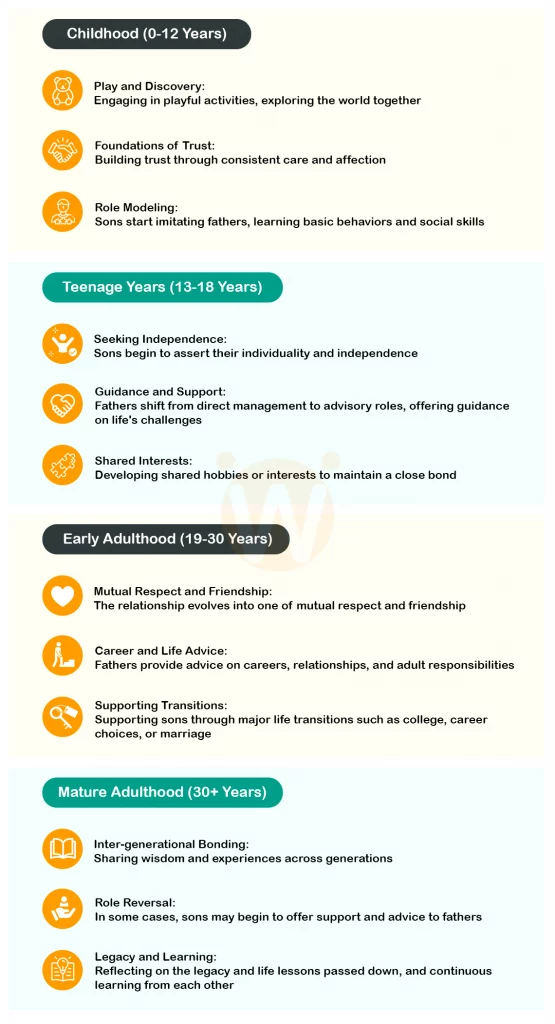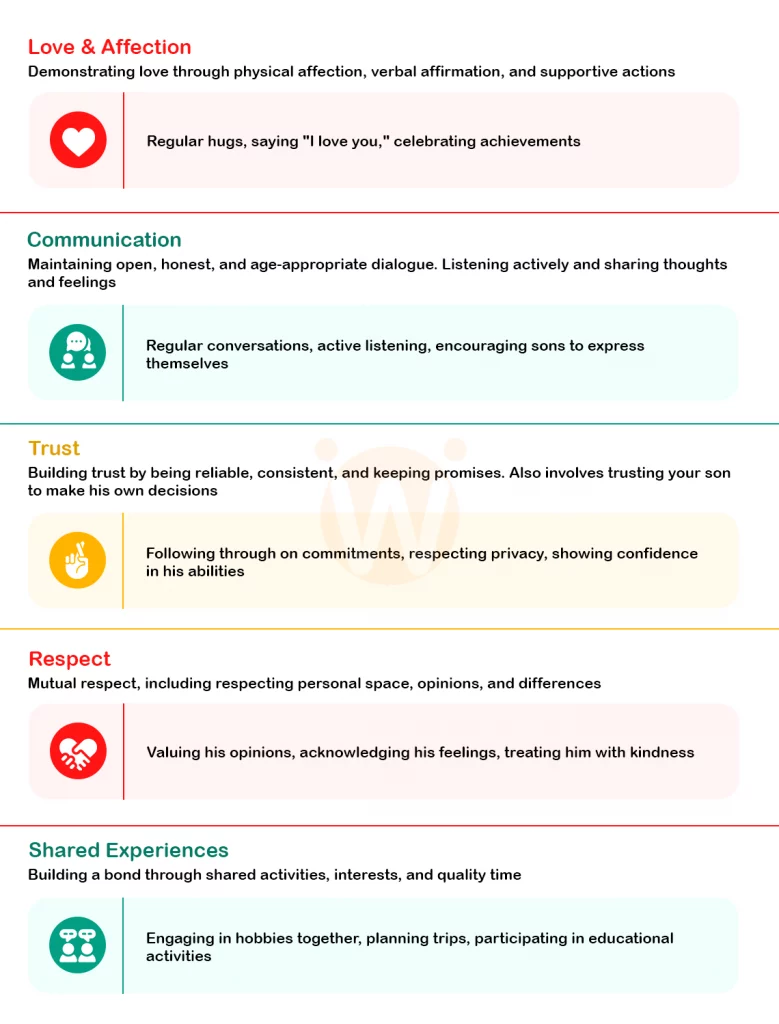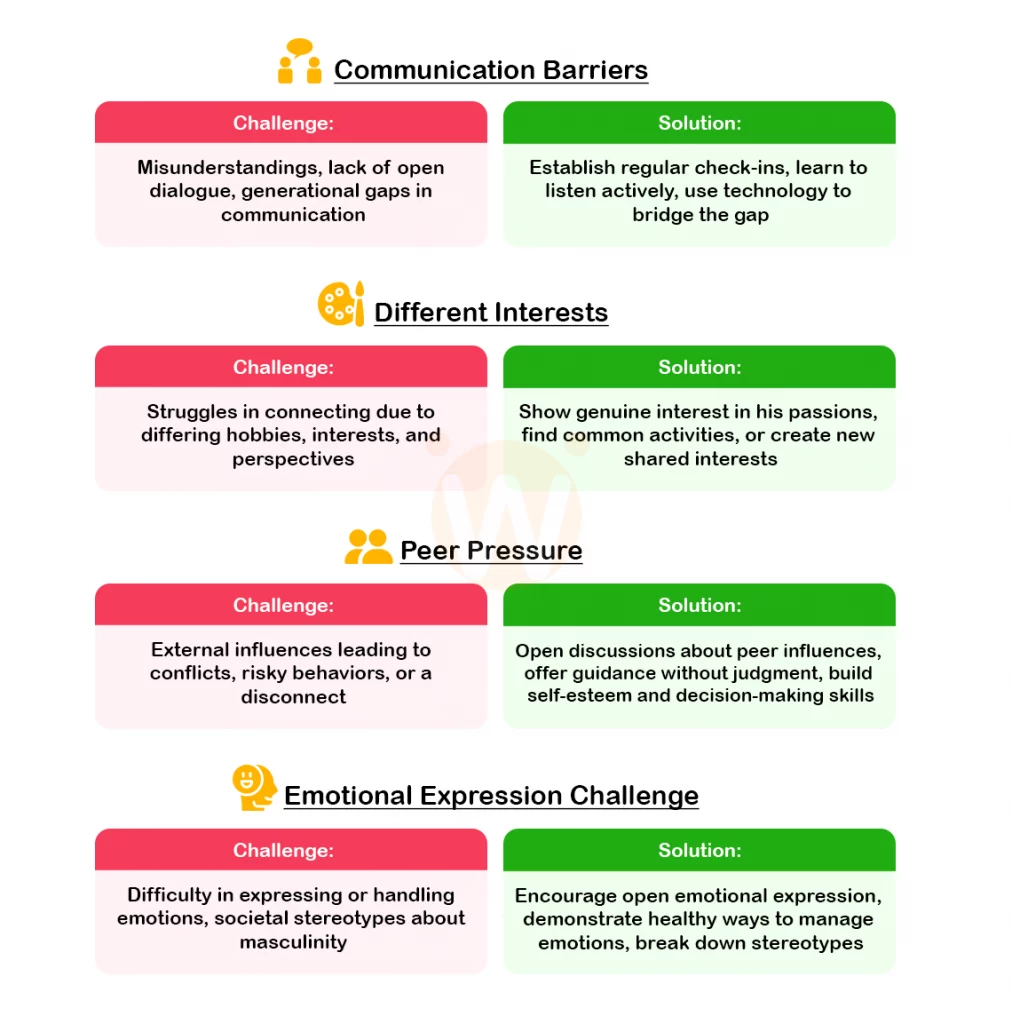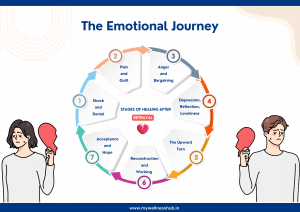Building Strong Father-Son Bonds: A Guide for Today’s Dads
By Prapoorna M
Last Updated: November 26, 2021
Introduction: The Cornerstone of Fatherhood – The Father-Son Relationship
The bond between a father and his son is more than just a familial connection; it’s a pivotal influence that shapes a young man’s journey from childhood to adulthood. This relationship is crucial in molding a child’s emotional, social, and cognitive development. It’s through this bond that sons learn about trust, respect, and the nuances of human relationships. A father’s influence touches every aspect of a son’s growth, laying the foundation for his interactions, perceptions, and his approach to life’s challenges. In essence, a father’s presence and involvement are key ingredients in the recipe for a well-rounded, confident, and emotionally healthy individual.

Section 1: Understanding the Role of a Father
The Unique Role of Fathers in Development
A father’s role in a child’s life is unique and irreplaceable. From teaching life skills to providing emotional support, fathers help guide their children through the complexities of life. Their influence extends beyond mere provision and protection, reaching into the realms of mentorship and friendship. This special bond not only helps shape a child’s character but also influences their future interactions and the way they perceive the world around them.

Differences in Relationships: Sons vs. Daughters
While a father’s love is universal, the way it manifests can differ between sons and daughters. With sons, fathers often find themselves as role models in terms of behavior, attitudes, and handling responsibilities. They set examples in strength, resilience, and emotional management. For daughters, fathers often represent the first male figure they interact with, thus shaping their expectations and understanding of male-female relationships. This dynamic plays a crucial role in how daughters will engage with other males throughout their lives.
Know more: Daughters Need Fathers | Dad and Daughter Duo | My Dad My Hero
Emphasizing Emotional Support, Security, and Role Modeling
At the heart of fatherhood is the provision of emotional support and security. A father’s support helps build a child’s confidence and self-esteem, making them feel valued and understood. Security, both physical and emotional, provided by a father, fosters a safe environment for growth and exploration. Moreover, fathers serve as role models, their actions and decisions setting a benchmark for their children. Children often look up to their fathers, learning by observing how they navigate life’s challenges, treat others, and uphold values. This modeling is fundamental in shaping a child’s character and future behaviors.
Section 2: Establishing a Strong Foundation
The Power of Love and Affection
Love and affection are the bedrock of any strong father-son relationship. Simple acts of love—like hugs, words of encouragement, and showing interest in your son’s life—foster a sense of belonging and security. This emotional connection lays the groundwork for a healthy relationship, making your son feel valued and understood. It’s important to remember that love isn’t just felt; it needs to be expressed. Regularly telling your son that you love him, celebrating his achievements, and being there for him during tough times are all expressions of love that reinforce your bond.

Setting Boundaries: Rules and Consequences
Creating a structured environment with clear rules and expectations is essential for a child’s development. Boundaries and guidelines help sons understand what is expected of them and the consequences of their actions. It’s not just about enforcing rules but also about teaching responsibility and self-discipline. Consistency in applying rules and consequences is key. Remember, discipline should be fair and balanced, always coming from a place of love and the desire to teach, rather than purely to punish.
Being a Role Model
Children learn a lot by observation, and as a father, you’re the first role model your son has. Your actions, how you handle stress, treat others, and manage responsibilities, all leave a lasting impression on him. Strive to be the person you want your son to become. Show respect, kindness, and integrity in your daily life. Your son will learn from your example, shaping his own character and values.
Section 3: Effective Communication and Quality Time
Listening and Empathizing: The Art of Understanding
Effective communication is more than just talking; it involves listening and empathizing. When your son speaks, give him your full attention, show interest, and try to understand his perspective. Empathize with his feelings, whether it’s excitement over a new hobby or frustration with schoolwork. This builds trust and shows that you value his thoughts and emotions. It’s not always about finding solutions; sometimes, just being heard is what your son needs.
Quality Time Together
Spending quality time together strengthens your bond. It’s not about the quantity of time, but the quality. Engage in activities that both of you enjoy, whether it’s playing a sport, building a model, or just taking a walk. Meals can also be a great opportunity for quality time, offering a chance for daily check-ins and sharing experiences. This time together is invaluable for building a strong, enduring relationship.
Creating Special Parent-Child Rituals
Personal rituals or traditions can make your son feel special and deepen your connection. It could be as simple as a weekly game night, a monthly hiking trip, or a special handshake. These rituals become cherished memories and a unique part of your relationship, reinforcing the bond between you and your son.
Section 4: Navigating the Challenges
Adapting to Developmental Stages
Each stage of your son’s growth brings its own set of challenges:
- Childhood: In these years, establishing a balance between fun and discipline is key. Encourage curiosity and play, while gently guiding and setting limits.
- Teenage Years: This stage is marked by a quest for independence. Maintain open communication, respect their growing need for autonomy, and guide them through social and academic pressures. Be patient and understanding, even as they test boundaries.
- Adulthood: As your son steps into adult life, your role shifts more to that of an advisor. Offer guidance when asked, support their decisions, and respect their independence.
Handling Complex Situations
- Divorce: In the event of divorce, protect your son from conflict. Maintain a positive relationship with your ex-partner and ensure your son feels loved and secure.
- Peer Pressure: Equip your son with the confidence to make his own choices. Discuss the importance of values and the strength to stand up for what he believes in.
- Differing Interests: Embrace your son’s unique interests, even if they differ from yours. Show support for his passions and use them as opportunities to connect.

Section 5: Teaching Resilience and Emotional Intelligence
Embracing Vulnerability
- Dealing with Failure: Teach your son that failure is a part of learning and growing. Share your own experiences with failure, and how you overcame them. This openness not only strengthens your bond but also teaches resilience.
- Expressing Emotions: Encourage your son to express his emotions. Show him that it’s okay to feel sad, angry, or frustrated and that expressing these feelings is a sign of strength, not weakness.
Developing Emotional Strength
- Facing Challenges: Equip your son with the skills to face life’s challenges. Teach problem-solving and critical thinking. Discuss various scenarios and potential solutions.
- Emotional Intelligence: Foster emotional intelligence by teaching empathy, self-awareness, and the ability to read others’ emotions. These skills are crucial for personal and professional success.
Section 6: Building Mutual Respect and Trust
Earning and Maintaining Respect and Trust
- Consistency in Actions: Show consistency between what you say and what you do. Keeping promises and being dependable are key to earning your son’s respect.
- Open and Honest Communication: Be open and honest in your communication. Admit when you’re wrong, and discuss your weaknesses and strengths. This transparency fosters trust.
- Respect Their Opinions: Show respect for your son’s thoughts and feelings. Encourage him to share his opinions and take them seriously, even if they differ from your own.
Impact on Future Relationships
- Modeling Respectful Behavior: Your interactions with others, especially with your partner and family members, serve as a blueprint for your son. Respectful, kind, and considerate behavior teaches him how to conduct his future relationships.
- Handling Conflicts: Demonstrate healthy ways to resolve conflicts. Your approach to problem-solving and communication in tough times sets a standard for how he will manage conflicts in his own life.
Section 7: Special Bonding Activities and Experiences
Activities to Strengthen the Bond
- Shared Hobbies: Engage in hobbies that both you and your son enjoy. It could be anything from model building, gardening, to playing a musical instrument together.
- Outdoor Adventures: Plan outdoor activities like camping, hiking, or fishing. These adventures create lasting memories and provide a great way to teach life skills.
- Sports and Physical Activities: Participate in sports together. Whether it’s playing catch, joining a community soccer team, or simply going for runs, these activities strengthen bonds and encourage a healthy lifestyle.
Activities for Bonding at Different Ages
| Age Group | Activity Ideas |
|---|---|
| 0-5 Years | Playground Visits, Story Time, Play Dough Fun, Simple Board Games, Animal Zoo Trips, Backyard Camping, Interactive Learning Games, Water Play, Bike Rides (with child seats/trailers) |
| 6-12 Years | Sports Games, DIY Projects (like building a birdhouse), Science Experiments, Biking, Hiking, Fishing, Cooking/Baking Together, Arts and Crafts, Visiting Museums, Board Games, Learning a Musical Instrument Together |
| 13-18 Years | Career Discussions, Attending Sports Events, Video Game Sessions, Working on a Car or Tech Projects, Learning New Skills Together (like coding or photography), Movie Nights with Discussions, Volunteering, Traveling, Attending Workshops or Seminars, Fitness Activities (like jogging or gym workouts) |
| 18+ Years | Career Planning, Financial Management Workshops, Cooking Classes, Hiking or Adventure Sports, Cultural Events, Book Clubs, Home DIY Projects, Family History Exploration, Attending Concerts or Sports Events, Traveling Together |
Role of Shared Interests
- Discovering Common Ground: Explore different activities to find mutual interests. Shared interests provide a natural and enjoyable way to spend time together.
- Learning from Each Other: Be open to learning from your son and vice versa. This can lead to a deeper understanding and appreciation of each other’s passions and abilities.
- Creating Traditions: Establish your own father-son traditions. Whether it’s attending a yearly sports event, a monthly book club, or a weekly cooking session, these traditions become something uniquely yours.
Section 8: Preparing for the Future
Equipping Sons for Adult Responsibilities
- Financial Management: Teach the basics of budgeting, saving, and investing. Encourage your son to manage his own finances through allowances or part-time jobs.
- Navigating Relationships: Discuss the importance of respect, communication, and boundaries in relationships. Share your experiences and listen to his views on friendship and love.
- Career Planning: Offer guidance on career choices. Share your journey, discuss options, and encourage internships or part-time work to explore interests.
Evolving Relationship into Adulthood
- Transition to Advisor: As your son matures, your role shifts more towards that of an advisor. Offer guidance when sought and support his journey towards independence.
- Lifelong Bond: Emphasize that while the nature of your relationship changes, the bond remains. Be open to learning from each other as adults.
Conclusion
The father-son relationship is a foundational pillar in a young man’s life. It shapes character, influences decisions, and impacts future relationships. Continually nurturing this bond is crucial. As fathers, the commitment to understand, guide, and grow with your son is a lifelong journey that reaps rewards for generations.
At Wellness Hub, we understand the complexities and challenges of father-son relationships. If you find yourself needing guidance, our team of experienced psychologists is here to help. Whether it’s navigating parenting challenges, improving communication, or dealing with specific issues, we offer professional advice and support.
We encourage fathers to continually learn and adapt in their role. Parenthood is a journey of growth, not just for your son but for you as well. As you guide your son towards the future, remember that seeking help is a sign of strength, not weakness. Visit us at Wellness Hub, and let’s work together in strengthening this vital relationship.
Frequently Asked Questions
How can I improve communication with my teenage son?
Encourage open dialogue without judgment. Be an active listener and show genuine interest in his thoughts and feelings. Establish regular times for casual conversations, like during meals or drives.
What should I do if my son and I have very different interests?
Embrace and show interest in his passions, even if they differ from yours. You can also find new activities to explore together, creating shared experiences and memories.
How can I teach my son about handling finances?
Start with the basics of budgeting and saving. Encourage him to manage a small budget, like his allowance or earnings from part-time jobs. Discuss financial responsibilities and the importance of financial planning.
As a father, how do I handle my own emotions while trying to be strong for my son?
It’s important to be authentic. Showing your emotions, including vulnerability, can teach your son that it’s okay to express feelings. It also helps in building a deeper emotional connection.
My son is facing peer pressure. How can I support him?
Discuss the importance of values and making choices based on what he believes is right. Provide guidance on how to handle difficult situations and reassure him that he can always come to you for support.
How can divorced fathers maintain a strong relationship with their sons?
Keep regular contact through visits, calls, and messages. Be involved in your son’s life by attending important events and showing interest in his daily activities. Maintaining a positive and respectful relationship with your ex-partner also helps.
What are some effective ways to discipline my son without harming our relationship?
Use discipline as a way to teach, not just to punish. Be clear about expectations and consequences. Use positive reinforcement and ensure that the discipline is age-appropriate.
How can I help my son prepare for adulthood?
Engage in conversations about future plans, including career and personal goals. Offer advice based on your experiences, and encourage him to explore his interests and passions.
Can father-son relationships benefit from professional counseling?
Yes, counseling can be beneficial, especially in navigating complex issues or improving communication. Professionals, like those at Wellness Hub, can provide tailored advice and strategies for strengthening the relationship.
Book your Free Consultation Today
Parent/Caregiver Info:
Client’s Details:
* Error Message









